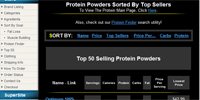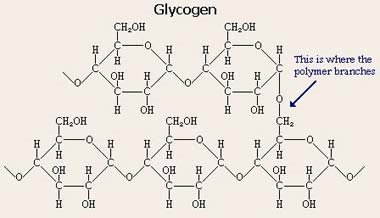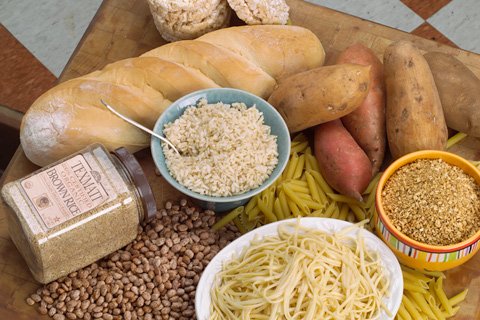| Article Summary: |
|

Layne's How To Guide For Bulking - The Macronutrients

Ah, tis fall! The leaves are falling from the trees and Christmas is around the corner, shall we begin to sing, tis the season to be bulking fa la la la la...
Ah, the art of the bulking diet. It is a simple concept, in theory, but many fail to master it. This failure is usually due to one or more of the following reasons:
- They don't keep their calories high enough; therefore, they fail to put on muscle mass
- Their caloric intake is too high over their maintenance level and they use the gain weight at all costs philosophy. This is great, right? Not really, for even though you put on a lot of weight, you'll lose a lot of muscle trying to cut it off once you diet since you'll have to diet more aggressively for a longer period of time.
- They aren't consistent enough with their meals.
Well never fear, I am here to help you. I have developed a bulking system that works for everyone that I have tried it on. One of my subjects put on as much as 30 lbs in 5 months of clean weight (his bodyfat increased only by 2%) without the help of steroids or prohormones...and he was an athlete who had been lifting for 5 years already! In this article I will talk about the system and provide a sample diet.

My System
I will give people who I have trained and placed on this diet a chance to give their feedback and advice. Before I talk about the system itself it is important that everyone understand the basics behind muscle growth and how calorie surplus helps you gain muscle.
So where do we start? Calories my friend, calories. In theory, gaining weight is simple. If you eat more calories than you burn, then you gain weight due to calorie surplus. Sounds easy right? Wrong! Some people (ectomorphs) with fast metabolisms need 4,000, 5,000, and as many as 6,000 calories per day to gain weight. That's a lot of calories! As a basic starting point you need to know your calorie maintenance level.
There are a bunch of fancy equations that use bodyweight, fat, age, etc. to calculate this level, but the best way to do it is experimentally. Write down the amount of calories you consume everyday for a week. If you don't gain weight that week, then that is your calorie maintenance level. Calories however, are not the only part of the equation. The macronutrient breakdown of a diet, and the timing of your caloric intake, can be the difference between muscular gain and fat gain.

Protein
When it comes right down to it, no other macromolecule is more important in the muscle building process than protein.
Protein is the only macromolecule that is used to synthesize muscle tissue. Amino acids are used for muscle protein synthesis, however these aminos are obtained through protein hydrolysis. The recommended daily amount (RDA) for protein is 50g per day. That only applies if you are a couch potato who weighs 150 lbs and has the metabolism of a snail. If you are a bodybuilder, you need more protein and here is why...
 |
Protein Powders: Sorted By Top Sellers. Protein powders are formulated to be the perfect meal in a quick and easy shake. It is easy to take them with you to work or school or anywhere that you need. [ Protein Powders Sorted By Top Sellers ] |

Lifting Weights
When you lift weights your muscle tissue is actually broken down (atrophied). Amino acids are then used to synthesize new muscle tissue. The body will enlarge the muscle so it will be stronger and better able to handle the same overload in the future (Note: This is a grossly oversimplified unscientific explanation of muscular hypertrophy in response to training but effective for our purposes). The amino acids that are used to synthesize muscle tissue do not appear out of thin air.
They come from your dietary protein intake. The synthesis of new muscle creates a deficit in your body's amino acid stores. In fact, if amino acid levels are not high enough, protein synthesis will slow or even stop as amino acid availability is a limiting factor in protein synthesis 1,2,3,4). What does this mean? To be direct, it means that if you are not eating enough protein, you are not maximizing your muscle protein synthesis and thus limiting your muscular gain.
How much protein are we talking? Anecdotal and scientific research suggests that 0.8g-1.0g protein per pound bodyweight is the magic number. However, this is for a bodybuilder with a slower metabolism (endomorph). Anecdotally, through working with various people and talking to other bodybuilders, (several professional natural bodybuilders) I believe that 1-1.5g of dietary protein per pound of bodyweight is ideal. If you have a slow metabolism then you should aim near the bottom of this spectrum. If you have a fast metabolism, aim for the higher end. If you have a medium metabolism, you should be somewhere in between.

Carbohydrates
Contrary to the new age belief that carbs are evil, carbohydrates are a very helpful macronutrient when one is trying to gain muscle. Carbohydrates assist the muscle building process in a couple ways. Carbohydrates spare amino acids from oxidation by providing a more readily available source of stored energy. When carbohydrates are ingested, they are first broken down (if need be) into monosaccharides in the stomach, and then released into the bloodstream. The cells receptors sense the rise in blood sugar and the body releases insulin to transport the saccharides into the cell.
Insulin attaches to GLUT receptors on the cell, which causes a conformational change in the receptor, causing the cell to open and allow the saccharide molecules into the cell. Once inside the cell, these saccharides are polymerized into glycogen. Glycogen is long branched chains of glucose polymers and is a stored form of energy for the cell. When the body needs energy, these chains can be broken down, and the glucose can be released to supply the cell with energy.
If glycogen levels are low, the body will oxidize proteins (amino acids) and fats for energy. This means you will be losing amino acids to oxidation which could be used for muscle protein synthesis. The body also stores 2.7g of water per gram of glycogen. A rise in protein synthesis is seen with increased cell volume and one of the reasons for this may be that the body will retain more amino acids inside the cell to maintain the concentration gradient across the lipid bilayer. Therefore, more amino acids will be available for protein synthesis and the rate of protein synthesis will increase accordingly.
Ingesting carbohydrates is also hormonally anabolic. As I stated earlier, carbohydrate intake causes insulin release. Insulin is a very anabolic hormone, it drives more nutrients (including amino acids) into cells by allowing them more openings on the cell to enter through. (once again, oversimplified, but effective for our purposes.) In addition, insulin has been found to be a limiting factor in muscle protein synthesis and also prevents protein breakdown (4,5,6,7,8,9).

Insulin
Insulin also inhibits the action of catabolic hormones such as glucogen and cortisol, the main catabolic hormone released during intense exercise sessions (10). Due to its anabolic and anti-catabolic effects, one can clearly see that insulin is a very useful tool in stimulating muscle protein synthesis. The hormone article will go into more depth into this subject.
Carbohydrates are also helpful in maintaining stored glycogen levels. Low glycogen levels can increase fatigue while training, leading to less productive workouts and lower energy levels. Lifting heavy weights is an anaerobic activity and requires ATP. ATP energy of hydrolysis is used to power many cellular functions including muscle contraction. Your body has very little stored ATP as it is a transient carrier of energy. The body prefers to produce ATP on demand.
After your stored ATP is used and your muscles use up their stored phosphocreatine, the body will begin to break down glycogen in order to produce ATP to provide the body with more energy. One can then see why low muscle glycogen stores would not be advantageous to people who lift with high intensity. Intense lifting sessions can deplete as much as 40% of the stored muscle glycogen! Therefore, eating carbohydrates throughout the day to keep muscle glycogen high is very important.

Fats
Fats are another misunderstood macronutrient. First, there was the low fat fad, followed by the high fat keto diet fad. It's no wonder nutrition confuses people! Moderation in all things is the key. Fats are essential nutrients. They are the body's preferred source of stored energy and the most efficient molecule for the body to burn. (in terms of energy yield per gram, 9kcals/gram) Also, fats are required for the synthesis of some hormones. Furthermore, fats are needed to keep hair, skin, and nails healthy. So what's the deal?
How much fat is too much and how much is too little? This is a difficult question to answer. If fat intake is too low, testosterone levels may be affected. There has been much research done on the effects of dietary fat on testosterone. However, the answer as to, How much fat is optimal? It is hard to decipher as there are big differences in the designs of the performed studies. This makes it difficult to standardize them to each other. Several studies concluded that diets low in fat (under 15% of total calories) significantly decreased testosterone levels while diets higher in fat (above 30% of total calories) increased serum testosterone levels(11 and 12).

Testosterone
Without going into too much depth on the studies themselves, I will provide my take on the issue. Although fat increases testosterone to a degree, it is important to remember that testosterone is only a small piece of the larger puzzle. There are many other hormones and factors involved in building muscle other than just testosterone.
If a diet that is extremely high in fat, for example 40% of daily calories, did in fact increase testosterone, you would still face deficiencies in other areas of your nutrition. You would have to lower your calories from carbohydrates and or protein to accommodate the increase of calories from fat. If you lower your protein intake too drastically, you will reduce the amino acids that are available for protein synthesis, thus limiting your muscular gain.

 Click To Enlarge.
Click To Enlarge.
Although Fat Increases Testosterone To A Degree, It Is Important
To Remember That Testosterone Is Only A Small Piece
Of The Larger Puzzle.
If you drop your carbohydrates too low, then you will be robbing yourself of many of the benefits of carbohydrates that I previously discussed. In addition, fats are the easiest molecule to be stored as adipose tissue (body fat). Carbohydrates and protein both must be enzymatically converted to fat and then stored in adipose tissue, while dietary fat requires no conversion and only needs to be sent to adipose tissue to be stored as fat. Clearly, one can see that too much dietary fat can then lead to excess body fat storage. Moderation of fat is especially important if calories are already high, as in the case of a bulking diet.
So, where do we go from here? Although the jury is still out, it appears that a diet with approximately 20-30% of the total calories coming from fat seems to be efficient in maintaining favorable testosterone levels. This level of fat intake leaves room for reasonable amounts of carbohydrates and proteins to be consumed as well.

Fat's Role In Your Diet
I'm sure your next question is, what kind of fat should I be eating? You will want to have a high intake of omega-3's and other good fatty acids. Eating nuts and other foods high in unsaturated fats in addition to supplementing with flax seed or fish oil is a good way to make sure your getting enough of these fats. However, do not try to totally cut out saturated fat. Saturated fat and cholesterol are needed for the synthesis of the steroid hormones in the body, including testosterone.
This does not mean one should simply pig out on saturated fats in order to try to increase testosterone levels. Saturated fat is more likely to be stored as body fat than unsaturated fat. Saturated fat contains no double bonds and can pack together very tightly (this is why butter is solid at room temperature). This tight packing makes it difficult for your body to metabolize them. However, unsaturated fats contain cis-double bonds. Cis-double bonds cause kinks in the tails of fatty acids, and prevent tight packing, making it easier for the body to metabolize them.
You should also be wary of trans-fatty acids (may be listed as hydrogenated oils) as they are very difficult for the body to metabolize and are also easily stored as fat. Think of your health in addition to muscle building. Diets high in saturated fat have been linked to heart disease. In order to maintain proper hormonal balance, without increasing your risk of heart disease and fat storage, make sure your saturated fat intake is only about 30% of your total fat intake.
References:
- The American Journal of Physiology, Oct 2002 v283 i4 pE648(10) "Essential amino acids and muscle protein recovery from resistance exercise." Elisabet Borsheim; Kevin D. Tipton; Steven E. Wolf; Robert R. Wolfe.
- The Journal of Nutrition, Oct 2002 v132 i10 p3219S(6) "Regulation of muscle protein by amino acids. " Robert R. Wolfe.
- The Journal of Nutrition, Oct 2002 v132 i10 p3225S(3) "Latency, duration and dose response relationships of amino acid effects on human muscle protein synthesis. " Michael J. Rennie; Julien Bohe; Robert R. Wolfe.
- The American Journal of Physiology, Sept 2001 v281 i3 pE565 "Amino acids and insulin are both required to regulate assembly of the eIF4E [multiplied by] eIF4G complex in rat skeletal muscle." MICHELE BALAGE; SANDRINE SINAUD; MAGALI PROD'HOMME; DOMINIQUE DARDEVET; THOMAS C. VARY; SCOT R. KIMBALL; LEONARD S. JEFFERSON; JEAN GRIZARD
- The American Journal of Physiology, May 2002 v282 i5 pE1029(10) "Aminoacyl-tRNA enrichment after a flood of labeled phenylalanine: insulin effect on muscle protein synthesis. " Giuseppe Caso; G. Charles Ford; K. Sreekumaran Nair; Peter J. Garlick; Margaret A. McNurlan.
- Diabetes, May 1999 v48 i5 pSA69 "Does Insulin Stimulate Muscle Protein Synthesis in Humans." ROBERT ALBRIGHT; MICHAEL JOYNER; NIKI DIETZ; K SREEKUMARAN NAIR.
- The American Journal of Physiology, Jan 1999 v276 i1 pE50(1) "Diazoxide-induced insulin deficiency greatly reduced muscle protein synthesis in rats: involvement of eIF4E." Sandrine Sinaud; Michele Balage; Gerard Bayle; Dominique Dardevet; Thomas C. Vary; Scot R. Kimball; Leonard S. Jefferson; Jean Grizard.
- The American Journal of Physiology, Sept 2001 v281 i3 pE565 "Amino acids and insulin are both required to regulate assembly of the eIF4E [multiplied by] eIF4G complex in rat skeletal muscle." MICHELE BALAGE; SANDRINE SINAUD; MAGALI PROD'HOMME; DOMINIQUE DARDEVET; THOMAS C. VARY; SCOT R. KIMBALL; LEONARD S. JEFFERSON; JEAN GRIZARD.
- Garrett, Reginald H. and Charles M. Grisham. Biochemistry 2nd Edition. Saunders College Publishing. United States: 1999.
- Family Practice News, Sept 1, 2001 v31 i17 p12 "Carbohydrate Drinks Cut Postexercise Cortisol." SALLY KOCH KUBETIN.
- The Journal of Nutrition, Sept 2000 v130 i9 p2356 "High Dietary Fat Intake Increases Renal Cyst Disease Progression in Han:SPRD-cy Rats." Shobana Jayapalan; M. Hossein Saboorian; Jeff W. Edmunds; Harold M. Aukema.
- American Journal of Clinical Nutrition, Dec 1996 v64 n6 p850(6) "Effects of dietary fat and fiber on plasma and urine androgens and estrogens in men: a controlled feeding study." Joanne F. Dorgan; Joseph T. Judd; Christopher Longcope; Charles Brown; Arthur Schatzkin; Beverly A. Clevidence; William S. Campbell; Padmanabhan P. Nair; Charlene Franz; Lisa Kahle; Philip R. Taylor.
Recommended Articles
| Share This Article: |





